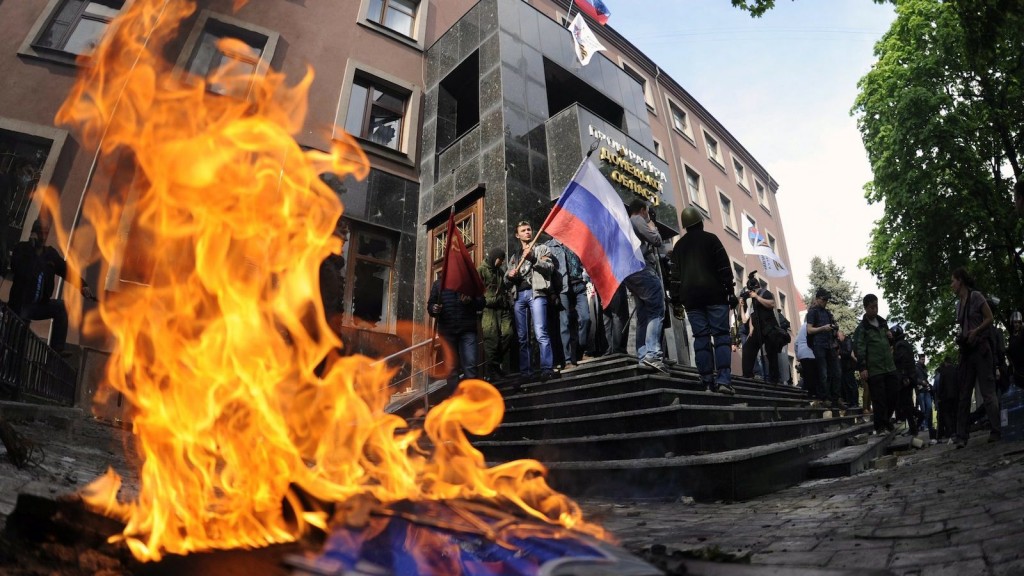Your morning five: Pro-Russians won’t delay their referendum
Also: Stephen Harper keeps on feuding
Pro-Russian protesters burn Ukrainian symbols in front of the regional administration building after clash with police in Donetsk, Ukraine, Thursday, May 1, 2014. Anti-government demonstrators in Donetsk have stormed the local prosecutor’s office. The clash came after a march by several hundred people carrying flags of the Donetsk People’s Republic, a movement that seeks either greater autonomy from the central government, or independence and possible annexation by Russia. (AP Photo/Evgeniy Maloletka)
Share

We tell you five things you need to know this morning.
1. Pro-Russians won’t delay a referendum on autonomy. Even as the urging of their political idol Vladimir Putin, activists in eastern Ukraine won’t move back a referendum they hope will provide a public mandate for greater autonomy from Kyiv’s government. Yesterday, Putin both expressed support for Ukraine’s broader presidential election in May and encouraged his activist allies to delay their planned referendum. But millions of ballots are at the printer and those behind the vote claim to be “the bullhorn of the people.” Meanwhile, pro-Ukrainian and anti-Kyiv forces continue to scuffle in the region.
2. China encourages more “mutual trust” with Canada. Beijing’s new ambassador to Canada, Luo Zhaohui, told The Globe and Mail‘s Nathan Vanderklippe that the trading relationship between the two nations has “very good momentum,” but that $60 billion in annual trade is “not enough.” Luo promised to buy more Canadian airplanes, blueberries (not BlackBerries) and beef, but he said the federal government should return to foreign investment rules that encourage Chinese-owned enterprise to invest in Canada—like, say, CNOOC’s approved takeover of Calgary-based Nexen.
3. Boko Haram attacked Gamboru Ngala. The terrorist group that’s ravaged northern Nigeria killed an estimated 300 people in the unguarded village. The troops charged with defending residents—who suffered attacks at the hands of Boko Haram earlier this week—searched for hundreds of abducted girls whom Boko Haram is hiding from the world. Canada may send surveillance equipment and technical experts to Nigeria to aid in the search for the girls.
4. The Harper-Wynne feud endures. Ontario’s premier upped the ante in her ongoing disagreement—or, ahem, war of words—with the Prime Minister over pension reform. Earlier this week, Stephen Harper confirmed he didn’t like Kathleen Wynne’s budget proposal to create an Ontario pension plan. Now, Wynne tells the Toronto Star that Harper told her in a private meeting last December that Canadians simply weren’t saving for their retirement, despite opportunities to do so, and smirked—cue speculation about Harper’s malevolence—as he apparently downplayed your average Canadian’s financial burden.
5. The Harper-McLachlin feud endures. If it really is a feud, that is. Everybody is guessing what Harper’s motives were, and are, with respect to the failed appointment of judge Marc Nadon to the Supreme Court and any prospective interactions between Harper, Justice Minister Peter MacKay, and Chief Justice Beverley McLachlin related to Nadon’s fate. Harper says he declined to participate in an inappropriate conversation with McLachlin before Nadon’s appointment. His critics say McLachlin never proposed anything inappropriate. Cue weeks of speculation about Harper’s malevolence.